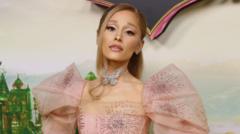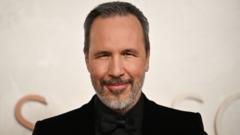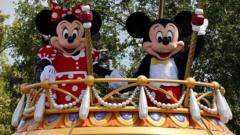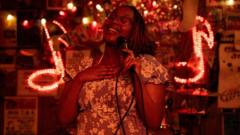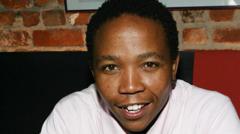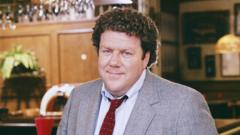“Conclave,” a film based on Robert Harris's novel, brings to light the dynamics and secrets of the papal election process. As the Vatican readies for the next conclave, the movie explores themes of isolation, politicking, and human fallibility, reflecting on the fascinating journey of choosing a new pope.
Exploring the Intricacies of the Papal Conclave Through "Conclave"
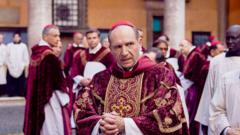
Exploring the Intricacies of the Papal Conclave Through "Conclave"
The acclaimed film "Conclave" offers insights into the mysterious papal election process as the world prepares for a new leader of the Roman Catholic Church.
Article Text:
The recent film "Conclave," which has captivated audiences and received Oscar accolades, delves into the enigmatic world of the papal election process, showcasing the complex dynamics that shape the choices made by the cardinals. With the actual conclave to elect Pope Francis's successor set to commence on May 7, viewers are offered a glimpse into the secluded and highly scrutinized avenue through which a leader for the Roman Catholic Church is chosen.
As depicted in the film, the conclave traditionally unfolds behind the closed doors of the Sistine Chapel, where 134 cardinals will assemble in solitude. This isolation not only aims to prevent outside influence but also fosters an environment ripe for introspection and deliberation. The stark contrast with the modern era's demand for transparency raises questions regarding the necessity of secrecy in such a significant process. The film evokes a profound atmosphere of responsibility, as commented by Anna Rowlands, a professor specializing in Catholic social thought, who highlights the emotional weight those cardinals carry during this pivotal moment.
In "Conclave," the narrative closely follows the intense political dynamics among the cardinals as they vie for support and negotiate alliances—adding layers of intrigue to the cinematic experience. Nick Emerson, the film's editor, describes the plot as steeped in the "political machinations" that underlie the electoral process. While divine intervention is a key belief for many cardinals, the realities of making critical decisions amid competing interests lead to complicated interactions well before the formal voting begins.
The film takes creative liberties, presenting an ostensibly unknown cardinal as a potential candidate, a twist that highlights an otherwise rigid selection process. In reality, the parameters set by prior pontiffs ensure that candidates have been publicly acknowledged before entering the conclave. However, the impending election is anticipated to be one of the most uncertain in recent memory, as approximately 80% of the voting cardinals were appointed under Pope Francis's tenure. His choice to elevate a diverse range of figures from around the globe introduces unpredictability regarding their motivations and priorities.
Director Edward Berger's interpretation seeks to humanize the cardinals, stripping them of an almost mythological pedestal. He illustrates them as individuals replete with modern realities—cell phones, personal vices, and emotional struggles. This representation echoes the sentiment expressed by Rowlands, who emphasizes that the conclave, while imbued with divine purpose, deeply reflects human experience filled with ambition, fear, and the quest for leadership.
As the world turns its attention to the conclave, "Conclave" serves as both an artistic exploration and a provocative reflection on the intertwining of the sacred and the secular in the selection of a new pope. The film invites audiences to contemplate not only the intricacies of this age-old ritual but also the very human attributes of those who partake in it.
The recent film "Conclave," which has captivated audiences and received Oscar accolades, delves into the enigmatic world of the papal election process, showcasing the complex dynamics that shape the choices made by the cardinals. With the actual conclave to elect Pope Francis's successor set to commence on May 7, viewers are offered a glimpse into the secluded and highly scrutinized avenue through which a leader for the Roman Catholic Church is chosen.
As depicted in the film, the conclave traditionally unfolds behind the closed doors of the Sistine Chapel, where 134 cardinals will assemble in solitude. This isolation not only aims to prevent outside influence but also fosters an environment ripe for introspection and deliberation. The stark contrast with the modern era's demand for transparency raises questions regarding the necessity of secrecy in such a significant process. The film evokes a profound atmosphere of responsibility, as commented by Anna Rowlands, a professor specializing in Catholic social thought, who highlights the emotional weight those cardinals carry during this pivotal moment.
In "Conclave," the narrative closely follows the intense political dynamics among the cardinals as they vie for support and negotiate alliances—adding layers of intrigue to the cinematic experience. Nick Emerson, the film's editor, describes the plot as steeped in the "political machinations" that underlie the electoral process. While divine intervention is a key belief for many cardinals, the realities of making critical decisions amid competing interests lead to complicated interactions well before the formal voting begins.
The film takes creative liberties, presenting an ostensibly unknown cardinal as a potential candidate, a twist that highlights an otherwise rigid selection process. In reality, the parameters set by prior pontiffs ensure that candidates have been publicly acknowledged before entering the conclave. However, the impending election is anticipated to be one of the most uncertain in recent memory, as approximately 80% of the voting cardinals were appointed under Pope Francis's tenure. His choice to elevate a diverse range of figures from around the globe introduces unpredictability regarding their motivations and priorities.
Director Edward Berger's interpretation seeks to humanize the cardinals, stripping them of an almost mythological pedestal. He illustrates them as individuals replete with modern realities—cell phones, personal vices, and emotional struggles. This representation echoes the sentiment expressed by Rowlands, who emphasizes that the conclave, while imbued with divine purpose, deeply reflects human experience filled with ambition, fear, and the quest for leadership.
As the world turns its attention to the conclave, "Conclave" serves as both an artistic exploration and a provocative reflection on the intertwining of the sacred and the secular in the selection of a new pope. The film invites audiences to contemplate not only the intricacies of this age-old ritual but also the very human attributes of those who partake in it.



